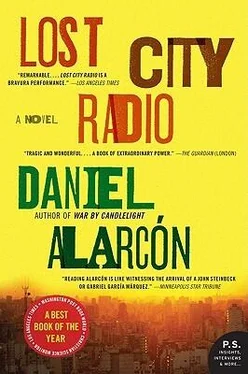At the end of the first day, Norma gathered her things and the boy, and they left for her apartment on the far side of the city, an hour away by bus. Victor seemed bewildered by it all. She imagined herself in his situation, in this strange and unhappy city of noise and dirt, and chose to interpret his silence as strength. All afternoon, the boy had slept on the sofa in the broadcast booth, waking every few hours to stare morosely at her. Besides asking for water, he’d hardly spoken at all. Once, as she read the news, she winked at him, but this had elicited no response. Now she held his hand as they rode, and thought of the jungle: Rey’s jungle. She had only seen it in photographs. It seemed to be the kind of geography that could inspire terror and joy in equal parts. The IL had been strong in Victor’s part of the country. They had camps hidden beneath the heavy canopy of the forest, and had organized communities of Indians in revolt against the government. They stored weapons and explosives that might still be there, buried in the loamy earth.
The bus rolled through the streets, in fitful half-block spans. The city sang chromatic and atonal: honks and whistles and the low rumbling of a thousand engines. The man seated next to them slept, his head lolling about, his briefcase tight against his chest. A heavyset boy a little older than Victor stood, his face frozen in a scowl, brazenly counting money, daring anyone to take it. It was the same every day, but Norma felt suddenly that she should have taken a cab or a crosstown train, that the spectacle might be overwhelming for a boy from a jungle hamlet. And it was. Victor, she noticed, was trying to slip his little hand out of hers. She gripped it tighter and looked down at him sternly. “Careful,” she said.
He glared and pulled his hand free, waving his liberated fingers in front of his face. The bus jerked to a stop, and he dashed off, through the door and into the street.
Norma could do nothing but follow.
It was the purple-hued end of the day. The boy was off and scampering down the sidewalk, in and out of the shadows. His footsteps went tap tap on the concrete, and Norma was alone in a part of the city she didn’t know, on a street quieter than most. The buildings were low and thick, so stoutly built they seemed ready to sink under their own weight, their stucco walls painted in mottled pastels. Victor’s spindly legs carried him down the block. There was no way she could catch him.
But she should have known by now how the city works. She was born here and raised here, and still its gestures bordered on the perverse, even more so after the war. Now it was something else entirely, something stranger. A white-haired man approached from a nearby doorway. He wore a thin, gray jacket over a yellowed undershirt. “Madam,” he said, “is that your boy?”
Victor was a tiny moving shadow bouncing in the orange lights of the streetlamps. She nodded.
“Pardon me,” the man said. He raised two fingers to his mouth and blew, piercing the low noise of the street with a sharp whistle. A head shot out of each window, and a moment later, a man or woman was standing at the door of each building. The man whistled again. He smiled benevolently at Norma, his warm face touched with red. They waited.
“Are you new to the neighborhood?”
“I don’t live here,” Norma said. She was wary of being recognized. “I’m sorry for the trouble.”
“It’s no trouble.”
They waited for a moment longer, and soon a matronly woman in a pale blue housedress was walking up the block, Victor in tow. The man spoke to himself as she approached — here you are, there we go — as if he were coaching her. She held the boy’s hand firmly, and he was hardly struggling at all. With a smile, she led the boy to Norma. “Madam,” she said, bowing, “your son.”
“Thank you,” Norma said.
A bus gurgled by, imposing silence on them. The three adults smiled at each other; poor Victor stood stiff, a prisoner ready for marching. Night was falling, a cool breeze whispering through the street. The man offered Norma his jacket, but she declined. The woman in the housedress turned to Norma. “Shall we help you beat him?” she asked graciously, straightening the folds of her dress.
The government counseled solid beatings of children, in the name of regaining that discipline lost in a decade of war. The station ran public-service announcements on the subject. Norma herself had recorded the voice-overs, but she’d never actually hit a child, having no children of her own. It shouldn’t have surprised her, but it did. “Oh, no,” Norma stammered. “I wouldn’t dare ask for help.”
“It’s no problem,” the white-haired man said. “We look out for each other here.”
They watched Norma expectantly. Victor, too, with steely eyes. They were such helpful people. “Maybe just a slap,” Norma said.
“That’s right!” The man leaned over the boy. “It’s how we learn, isn’t that right, son?”
Victor nodded blankly. Norma was struck again by how strange the city must seem to him. The truth is, everything had changed. She didn’t even recognize it anymore. She’d heard of places in the countryside where life continued as it always had; of villages in the mountains, in the jungle, where the war had passed by, unperceived. But not here. Parts of the city had been abandoned, the IL had detonated buildings, the army had torched entire neighborhoods in search of subversives. The Great Blackouts, the Battle of Tamoé: wounds severe enough to be named. 1797 had not been spared, either. She could see that in Victor’s eyes. We are in a new stage, the president had announced, a stage of militarized calm. A rebuilding stage. An unruly child should be punished. The woman held Victor by his shoulders. But how do you do it? Victor was a skeletal thing, a nothing child, easily broken. He didn’t blink; he stared.
Norma raised her right arm up above her head, stalled for a moment. She brushed her hair back. She knew what she should do: let gravity guide her, imitate all the mothers she’d seen in the streets, in the markets, on public transport. Her duty. She closed her eyes for a moment, long enough to imagine it: Victor’s head flopping to one side like a doll’s, a red handprint blooming on his cheek. He wouldn’t make a sound.
“I’m sorry,” Norma said. “I can’t.”
“Of course you can.”
“No. I’m sorry. He’s not mine.”
The woman nodded, but she hadn’t understood. She smothered Victor in an embrace. “Your mother spoils you, boy,” the woman said.
“She’s not my mother.”
Norma’s fingers had gone numb. She looked at the boy and felt terrible. “He’s not mine,” she repeated.
The woman in the housedress rubbed the child’s bald head. Without looking up at Norma, she said, “You sound so familiar.”
Above, the streetlamp flickered on. It was night now. Norma shrugged. “I get that a lot. We should be going. Thank you for everything.”
“She’s from the radio,” said Victor, folding his arms across his chest. “Lost City.”
The white-haired man looked up, startled. “God is merciful.”
Norma watched the glow of recognition pass across their faces. She pulled Victor toward her, took his hand in hers. “Don’t talk nonsense, child,” she scolded.
But it was too late. “Miss Norma?” The woman stepped closer to her, as if by looking at her she could tell. “Is that you? Say something, please; let me hear you!”
At her side, the man’s smile was bright and orange beneath the streetlamp. “It’s her,” he said, and whistled a third time, while Norma muttered protests.
The streets filled with people.
BEFORE THE war began, those of Norma’s generation still spoke of violence with awe and reverence: cleansing violence, purifying violence, violence that would spawn virtue. It was all anyone could talk about, and those who did not or could not accept violence as a necessity weren’t taken seriously. It was embedded in the language young people used in those days. It was the language that her husband, Rey, fell in love with.
Читать дальше












